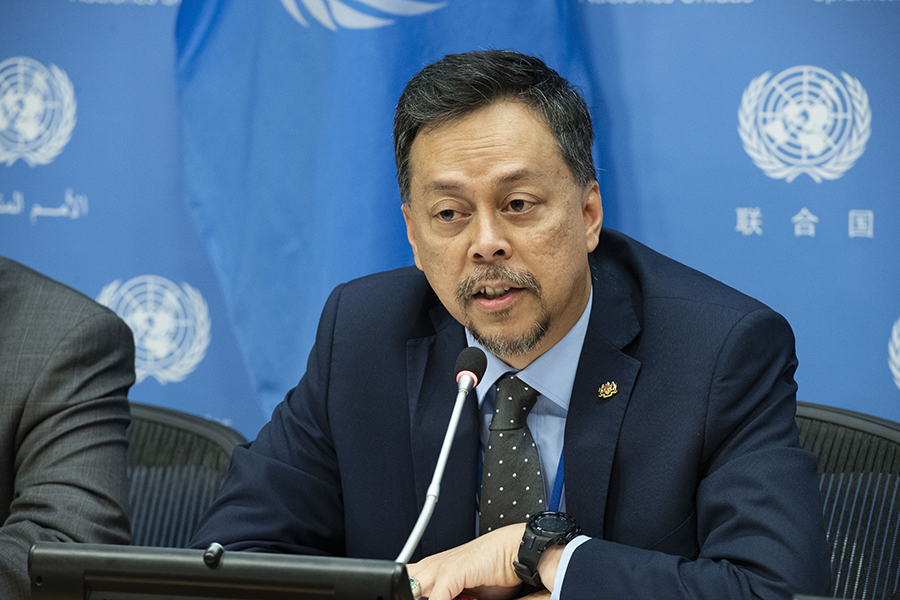NPT Meeting Looks to 2020 Review Conference
June 2019
By Alicia Sanders-Zakre
Despite some procedural successes, the final preparatory meeting before the 2020 review conference for the nuclear Nonproliferation Treaty (NPT) foreshadowed difficult times ahead. The 2019 NPT Preparatory Committee ended its session May 10 after two weeks of debate that prevented participants from reaching consensus on recommendations for the treaty’s 10th review conference next year, the 50th anniversary of the pact’s entry into force.
 The debate highlighted the nonproliferation crisis in Iran, which announced midway through the meeting that it would cease to abide by some of the restrictions imposed by the 2015 multilateral nuclear deal formally known as the Joint Comprehensive Plan of Action (JCPOA). Iran’s announcement came one year after the United States withdrew from the deal and after recent U.S. moves to reimpose sanctions waived by the deal and to levy additional punitive measures. Iranian President Hassan Rouhani warned that Iran could take retaliatory measures in 60 days should the remaining five parties to the JCPOA fail to thwart U.S. sanctions on Tehran’s oil and banking transactions.
The debate highlighted the nonproliferation crisis in Iran, which announced midway through the meeting that it would cease to abide by some of the restrictions imposed by the 2015 multilateral nuclear deal formally known as the Joint Comprehensive Plan of Action (JCPOA). Iran’s announcement came one year after the United States withdrew from the deal and after recent U.S. moves to reimpose sanctions waived by the deal and to levy additional punitive measures. Iranian President Hassan Rouhani warned that Iran could take retaliatory measures in 60 days should the remaining five parties to the JCPOA fail to thwart U.S. sanctions on Tehran’s oil and banking transactions.
The dispute between the two countries bled into the conference room, where Iran and the United States engaged in bitter “right of reply” exchanges and Iran made veiled threats in response to the U.S. pressure campaign.
The United States “continues to exert maximum pressure to dismantle the JCPOA and [UN Security Council] Resolution 2231,” said Iran’s opening statement, referring to the council decision to endorse the nuclear deal. “These pressures, if continued, will be detrimental not only to the stability and security in the Middle East region, but to the NPT. ... Such policies will not be left unanswered and Iran will adopt appropriate measures to preserve its supreme national interests.”
Should Iran decide to withdraw fully from the JCPOA or even from the NPT itself as some Iranian press reports in early May suggested Iran was considering, the 2020 review conference will face another nonproliferation crisis.
North Korea’s nuclear program took a backseat to the woes of the JCPOA at the preparatory committee meeting, although many states, including in a joint statement delivered by France on behalf of 70 states, urged North Korea to turn its words committing to denuclearization into action and rejoin the NPT as a non-nuclear-weapon state.
The pace of progress toward nuclear disarmament by the NPT’s recognized nuclear-weapon states concerned a majority of states, dozens of which called on Russia and the United States to extend the New Strategic Arms Reduction Treaty before it expires in 2021.
States also remained split on how to advance the creation of a zone free of weapons of mass destruction in the Middle East and on attending a November UN conference in New York on the topic. The United States declared it would not participate in that meeting, Russia encouraged all nuclear-weapon states to take part, and the United Kingdom stated it was still deliberating whether to attend.
These numerous fault lines led to the preparatory committee meeting’s failure to adopt recommendations for next year’s review conference. Consensus on the recommendations drafted by meeting chair Syed Hussin of Malaysia was doomed after several nuclear-weapon states and some of their allies objected to language sought by a majority of NPT states-parties. The draft recommendations were issued instead as a working paper submitted by Hussin, who also issued an eight-paragraph reflection on the meeting.
The meeting was more successful in clearing several procedural hurdles. It adopted an agenda for the 2020 review conference and agreed that Argentine diplomat Rafael Mariano Grossi will serve as president of next year’s meeting pending his formal nomination in the last quarter of 2019. Grossi’s selection as president has been delayed by Venezuela, which chairs the Non-Aligned Movement (NAM), which recommends the next president. But Venezuela will relinquish the NAM chair later this year, opening the door for Grossi’s selection.
Grossi took the decision as an immediate authorization, and he told the preparatory committee at the final session of the meeting that he would begin his work the next business day by launching extensive consultations with diplomats and other relevant actors in every region.
|
U.S. Swedish Proposals Address Nuclear Disarmament The second proposal came from Sweden, which introduced an initiative to build support around key disarmament “stepping stones” in a working paper to the preparatory committee. The goal of the approach is to find “common ground” steps on “concrete progress,” Sweden told the meeting. The working paper recommends that the 2020 review conference agree on a document that reaffirms the NPT as the cornerstone for nuclear disarmament and nonproliferation, the validity of previous NPT commitments, the expression that “a nuclear war cannot be won and must never be fought,” an improved NPT process, and realistic measures for disarmament based on a “stepping stone” approach that could reduce the salience of nuclear weapons, rebuild habits of cooperation, reduce nuclear risks, and enhance transparency. Sweden will host a ministerial-level meeting on June 11 on mobilizing political support for an “ambitious yet realistic agenda.” New Zealand voiced its support for the Swedish approach, stating that it applies “pragmatism to the process for implementation of the established disarmament agenda.”—ALICIA SANDERS-ZAKRE |
